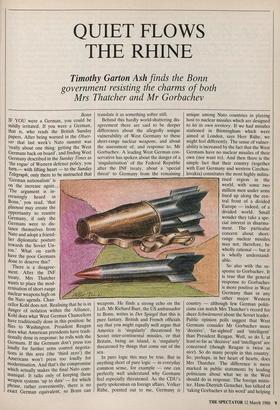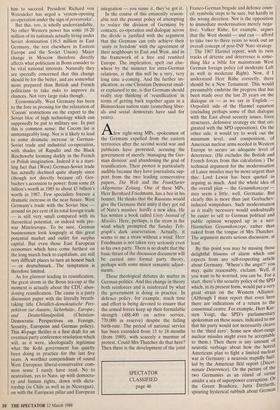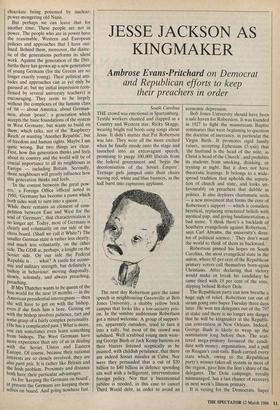QUIET FLOWS THE RHINE
Timothy Garton Ash finds the Bonn
government resisting the charms of both Mrs Thatcher and Mr Gorbachev
Bonn IF YOU were a German, you could be mildly irritated. If you were a German, that is, who reads the British Sunday papers. After being warned in the Obser- ver that last week's Nato summit was 'really about one thing: getting the West Germans back on board', and finding West Germany described in the Sunday Times as the rogue' of Western defence policy, you turn.— with lifting heart — to the Sunday Telegraph, only there to be instructed that 'German nationalism' is on the increase again., The argument is in- creasingly heard in Bonn,' you read, 'that glasnost may create the Opportunity to reunite Germany, if only the Germans were to dis- tance themselves from Nato and adopt a friend- lier diplomatic posture towards the Soviet Un- ion.' What on earth have the poor Germans done to deserve this?
There is a disagree- ment. After the INF treaty, Mrs Thatcher wants to place the mod- ernisation of short-range nuclear weapons high on the Nato agenda. Chan- cellor Kohl does not. Realising that he is in danger of isolation within the Alliance, Kohl does what West German Chancellors have traditionally done in this position: he flies to Washington. President Reagan does what American presidents have tradi- tionally done in response: he rolls with the Germans. If the Germans don't press too loudly for further arms control negotia- tions in this area (the 'third zero') the Americans won't press too loudly for modernisation. And that's the compromise Which actually makes the final Nato com- munique. It talks only of keeping these Weapon systems `up to date' — for which phrase, rather conveniently, there is no exact German equivalent, so Bonn can translate it as something softer still.
Behind this hardly world-shattering dis- agreement there are said to be deeper differences about the allegedly unique vulnerability of West Germany to these short-range nuclear weapons, and about the assessment of, and response to, Mr Gorbachev. A leading West German con- servative has spoken about the danger of a `singularisation' of the Federal Republic after the INF treaty, about a 'special threat' to Germany from the remaining weapons. He finds a strong echo on the Left. Mr Richard Burt, the US ambassador to Bonn, writes in Der Spiegel that this is pure fantasy. British and French officials say that you might equally well argue that America is 'singularly' threatened by Soviet inter-continental missiles, or that Britain, being an island, is 'singularly' threatened by things that come out of the sea.
In pure logic this may be true. But in anything short of pure logic — in everyday common sense, for example — one can perfectly well understand why Germans feel especially threatened. As the CDU's party spokesman on foreign affairs, Volker Rfihe, pointed out to me, Germany is unique among Nato countries in playing host to nuclear missiles which are designed to hit its own territory. If we had missiles stationed in Birmingham which were aimed at London, says Herr Riihe, we might feel differently. The sense of vulner- ability is increased by the fact that the West Germans have no nuclear missiles of their own (nor want to). And then there is the simple fact that their country (together with East Germany and western Czechos- lovakia) constitutes the most highly milita- rised region in the world, with some two million men under arms lined up along the cen- tral front of a divided Europe — indeed, of a divided world. Small wonder they take a spe- cial interest in disarma- ment. The particular concern about short- range nuclear missiles may not, therefore, be wholly rational — but it is wholly understand- able, So also with the re- sponse to Gorbachev. It is true that the general response to Gorbachev is more positive in West Germany than in any other major Western country — although few German politi- cians can match Mrs Thatcher's record for sheer Schweirmerei about the Soviet leader. Public opinion polls suggest that West Germans consider Mr Gorbachev more 'decisive', 'far-sighted' and 'intelligent' than President Reagan. Well, so do I, at least so far as 'decisive' and 'intelligent' are concerned (though Reagan is twice as nice). So do many people in this country. So, perhaps, in her heart of hearts, does Mrs Thatcher. The difference is more marked in public statements by leading politicians about what we in the West should do in response. The foreign minis- ter, Hans-Dietrich Genscher, has talked of 'taking Gorbachev at his word' and helping him to succeed. President Richard von Weizsacker has urged a 'system-opening co-operation under the sign of perestroika'.
But this, too, is wholly understandable. No other Western power has some 18-20 million of its nationals actually living under Soviet domination (16.5 million in East Germany, the rest elsewhere in Eastern Europe and the Soviet Union). Major change in Moscow therefore directly affects what politicians in Bonn consider to be vital national interests. Naturally they are specially concerned that this change should be for the better, and are somewhat more prepared than British and French politicians to take risks to improve its chances. Not very large risks though.
Economically, West Germany has been to the fore in pressing for the relaxation of `Cocom' restrictions on the export to the Soviet bloc of high technology which can supposedly be put to military use. In part this is common sense: the Cocom list is unmanageably long. Nor is it likely to lead to some dramatic increase in German- Soviet trade and industrial co-operation, with shades of Rapallo and the Black Reichswehr looming darkly in the French or Polish imagination. Indeed it is a start- ling fact that (West) German-Soviet trade has actually declined quite sharply since (though not directly because of) Gor- bachev's accession to power: from some £8 billion's worth in 1985 to about £5 billion's worth in 1987. Few specialists foresee a dramatic increase in the near future. West Germany's trade with the Soviet bloc — around six per cent of its total foreign trade — is still very small compared with its theoretical potential, or indeed with pre- war Mitteleuropa. To be sure, German businessmen look longingly at this great potential market and outlet for surplus capital. But even those East European economies which have come furthest on the long march back to capitalism, are still very difficult places to turn an honest buck — or deutschmark. The temptation is therefore limited.
As for glasnost leading to reunification, the great storm in the Bonn tea-cup at the moment is actually about the CDU aban- doning reunification. The cause is a party discussion paper with the literally breath- taking title Christlich-demokratische Pers- pektiven zur Aussen-, Sicherheits-, Europa-, und Deutschlandpolitik (Christian- Democratic Perspectives on Foreign, Security, European and German policy). This 40-page thriller is a first draft for an eventual party conference resolution which will, as it were, ideologically legitimise what the Kohl government has quietly been doing in practice for the last five years. A worthier compendium of sound West European liberal-conservative com- mon sense I rarely have read. No to neutralism, yes to Nato, up with democra- cy and human rights, down with dicta- torship (in Chile as well as in Nicaragua), on with the European pillar and European integration — you name it, they've got it.
In the course of this eminently reason- able text the present policy of attempting to reduce the division of Germany by contacts, co-operation and dialogue across the divide is justified with the argument that the Germans can only achieve their 'unity in freedom' with the agreement of their neighbours to East and West, and in the framework of a free and reunited Europe. The implication, spelt out else- where by the minister for intra-German relations, is that this will be a very, very long time a-coming. And the further im- plication, as one Christian Democrat insid- er explained to me, is that Germans should really stop thinking of 'reunification' in terms of getting back together again in a Bismarckian nation state (something liber- als and social democrats have said for years).
Afew right-wing MPs, spokesmen of the Germans expelled from the eastern territories after the second world war and publicists have protested, accusing the government of merely 'managing the Ger- man division' and abandoning the goal of reunification. Their protest is particularly audible because they have journalistic sup- port from the two leading conservative papers, Die Welt and the Frankfurter Allgemeine Zeitung. One of these MPs, Herr Bernhard Friedmann, has a bee in his bonnet. He thinks that the Russians would give the Germans their unity if they got rid of Nato's missiles: hardly a new idea. He has written a book called Unity Instead of Missiles. Here, perhaps, is the straw in the wind which prompted the Sunday Tele- graph's dark asseveration. Actually, it seems to me a straw without a wind. Herr Friedmann is not taken very seriously even in his own party. There is no doubt that the basic thrust of the discussion document will be carried into formal party theory, perhaps with some minor semantic adjust- ments.
These theological debates do matter in German politics. And this change in theory both reinforces and is reinforced by what the government is doing in practice. In defence policy, for example, much time and effort is being devoted to ensure that the armed forces keep up their formidable strength (488,400 on active service, 770,000 in reserve) despite the falling birth-rate. The period of national service has been extended from 15 to 18 months (from 1989), with scarcely a murmur of protest. Could Mrs Thatcher do that here? Then there is the development of the joint Franco-German brigade and defence coun- cil: symbolic steps to be sure, but hardly in the wrong direction. Nor is the opposition to immediate modernisation merely nega- tive. Volker Riihe, for example, argues that the West should — and can — afford to take two to three years to work out an overall concept of post-INF Nato strategy.
The 1967 Harmel report, with its twin tracks of détente and deterrence is some- thing like a bible for mainstream West German foreign policy (of moderate Left as well as moderate Right). Now, if I understand Herr Riihe correctly, there should be a New Testament. This would presumably enshrine the progress that has been made over the last 20 years on the dialogue or — as we say in English — Ostpolitik side of the Harmel equation (including perhaps some of that dialogue with the East about security issues, force structures, defensive strategy etc that ori- ginated with the SPD opposition). On the other side, it would try to work out the minimum level, and composition, of American nuclear arms needed in Western Europe to secure an adequate level of deterrence. (He excludes the British and French forces from this calculation.) The technical argument for the modernisation of Lance missiles may be more urgent than this: Lord Lewin has been quoted as arguing as much. And the whole idea of the overall plan — the Gesamtkonzept — may seem a little, well, Germanic. But clearly this is more than just Gorbachev- induced wimpishnes. Such modernisation as is really necessary would undoubtedly be easier to sell to German political and public opinion wrapped up in a neo- Harmelian Gesamtkonzept, rather than naked from the tongue of Mrs Thatcher. The argument merits serious discussion, at least.
By this point you may be missing those delightful frissons of alarm which one expects from any self-respecting article about Germany. 'Where's the angst?' you may, quite reasonably, exclaim. Well, if you want to be worried, you can be. For a start, there's the security policy of the SPD which, in its present form, would put a very great strain on the Western Alliance. (Although I must report that even here there are indications of a return to the consensual centre. For example, Herr Kar- sten Voigt, the SPD's parliamentary spokesman on these issues, indicated to me that his party would not necessarily cleave to the 'third zero'. Some new short-range nuclear missiles might even be acceptable to them.) Then there is any amount of neurotic verbiage about how the horrid Americans plan to fight a limited nuclear war in Germany: a neurosis stupidly fuel- led by the American Ikle report (Discri- minate Deterrence). Or the picture of the two Germanies as an island of virtue amidst a sea of superpower corruption. Or the Green Boadicea, Jutta Dittfurth, spouting hysterical rubbish about German chocolate being poisoned by nuclear- power-mongering old Nazis.
But perhaps we can leave that for another time. These people are not in power. The people who are in power have the reasonable, Western and European policies and approaches that I have out- lined. Behind them, moreover, the dialec- tic of the generations performs its silent work. Against the generation of the Ditt- furths there has grown up a new generation of young Germans (for the Greens are no longer exactly young). Their political atti- tudes and approaches can as yet only be guessed at; but my initial impression (con- firmed by several university teachers) is encouraging. They seem to be largely Without the complexes of the famous class of '68 — about America, about German- ness, about 'peace'; a generation which accepts the basic foundations of the system in West Germany, but wants to build on them; which talks, not of the 'Raspberry Reich' or wanting 'Another Republic', but of freedom and human rights. Maybe I am quite wrong. But two things are clear. First, how this generation thinks and feels about its country and the world will be of Crucial importance to all its neighbours in Europe -- including Britain. Secondly, those neighbours will greatly influence how this generation thinks and feels. 'In the contest between the great pow- ers,' a Foreign Office Official noted in 1950, `Germany has become a pawn which both sides wish to turn into a queen . . . While there remains an element of com- petition between East and West for the soul of `Germany', that characterisation is no longer apt. Today, most of Germany is clearly and voluntarily on our side of the chess board. (Shall we call it White?) The smaller German state is rather less clearly, and much less voluntarily, on the other side. The GDR is, perhaps, a knight on the Soviet side. On our side the Federal Republic is . . . what? A castle for econo- mic and military strength, but definitely a bishop in behaviour: moving diagonally, Slowly, solemnly, and always preaching, Preaching. If Mrs Thatcher wants to be queen of the free world for the next 18 months — in the American presidential interregnum — then she will have to get on with the bishop, even if she finds him a bore. Getting on with the bishop involves patience, tact and some grasp of a fairly complex personality. (He has a complicated past.) What is more, one can sometimes even learn something from bishops. The West Germans have more experience than any of us in dealing with the Soviet Union and Eastern Europe. Of course, because their national interests are so closely involved, they are also parti pris. It is rather like Britain and the Irish problem. Proximity and distance both have their particular advantages. As for 'keeping the Germans on board', at present the Germans are keeping them- selves on board. And going nowhere fast.




















































 Previous page
Previous page